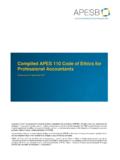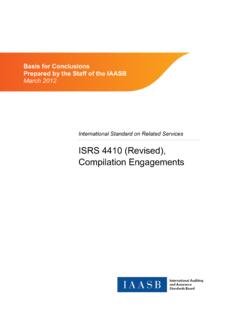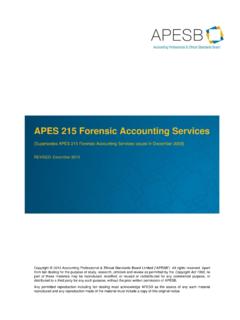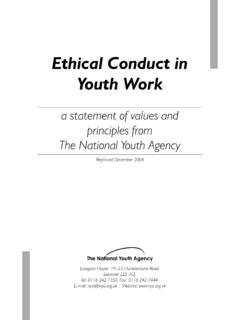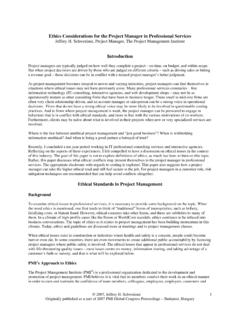Transcription of APES 110 Code of Ethics for Professional Accountants
1 APES 110 code of Ethics for Professional Accountants [Supersedes APES 110 code of Ethics for Professional Accountants (Issued in June 2006 and subsequently amended in February 2008)] ISSUED: December 2010 Copyright 2010 Accounting Professional & ethical Standards Board Limited ( APESB ). All rights reserved. Apart from fair dealing for the purpose of study, research, criticism and review as permitted by the Copyright Act 1968, no part of these materials may be reproduced, modified, or reused or redistributed for any commercial purpose, or distributed to a third party for any such purpose, without the prior written permission of APESB.
2 Any permitted reproduction including fair dealing must acknowledge APESB as the source of any such material reproduced and any reproduction made of the material must include a copy of this original notice. 2 CONTENTS Page 1 SCOPE AND 3 2 DEFINITIONS .. 4 PART A: GENERAL APPLICATION OF THE code .. 11 100 Introduction and Fundamental Principles .. 12 110 Integrity .. 17 120 Objectivity .. 18 130 Professional Competence and Due Care .. 19 140 Confidentiality .. 20 150 Professional Behaviour .. 22 PART B: MEMBERS IN PUBLIC 23 200 Introduction.
3 24 210 Professional Appointment .. 28 220 Conflicts of Interest .. 31 230 Second Opinions .. 33 240 Fees and Other Types of Remuneration .. 34 250 Marketing Professional Services .. 36 260 Gifts and Hospitality .. 37 270 Custody of client Assets .. 38 280 Objectivity All Services .. 39 [AUST] PREFACE: SECTIONS 290 AND 291 .. 40 290 Independence Audit and Review Engagements .. 41 291 Independence Other Assurance Engagements .. 92 PART C: MEMBERS IN BUSINESS .. 120 300 Introduction .. 121 310 Potential Conflicts.
4 124 320 Preparation and Reporting of Information .. 125 330 Acting with Sufficient Expertise .. 127 340 Financial Interests .. 128 350 Inducements .. 130 TRANSITIONAL PROVISIONS .. 132 CONFORMITY WITH INTERNATIONAL PRONOUNCEMENTS .. 133 3 1 SCOPE AND APPLICATION Accounting Professional & ethical Standards Board Limited (APESB) issues APES 110 code of Ethics for Professional Accountants (this code ). This code is operative from 1 July 2011 and supersedes APES 110 code of Ethics for Professional Accountants (issued in June 2006 and subsequently amended in February 2008).
5 Earlier adoption of this code is permitted. Transitional provisions relating to Public Interest Entities, partner rotation, non-assurance services, Fees relative size, compensation and evaluation policies apply from the date specified in the respective transitional provisions (refer page 132). All Members in Australia shall comply with APES 110 including when providing Professional Services in an honorary capacity. All Members practicing outside of Australia shall comply with APES 110 to the extent to which they are not prevented from so doing by specific requirements of local laws and/or regulations.
6 This code is not intended to detract from any responsibilities which may be imposed by law or regulation. AUASB has issued auditing standards as legislative instruments under the Corporations Act 2001 (the Act). For audits and reviews under the Act, those standards have legal enforceability. To the extent that those auditing standards make reference to relevant ethical requirements, the requirements of APES 110 have legal enforceability due to Auditing Standard ASA 102 Compliance with ethical Requirements when Performing Audits, Reviews and Other Assurance Engagements.
7 All references to Professional Standards, guidance notes and legislation are references to those provisions as amended from time to time. In applying the requirements outlined in this code , Members shall be guided, not merely by the words, but also by the spirit of this code . 4 2 DEFINITIONS In this code of Ethics for Professional Accountants the following expressions have the following meanings assigned to them: [AUST] AASB means the Australian statutory body called the Australian Accounting Standards Board that was established under section 226 of the Australian Securities and Investments Commission Act 1989 and is continued in existence by section 261 of the Australian Securities and Investments Commission Act 2001.
8 Acceptable Level means a level at which a reasonable and informed third party would be likely to conclude, weighing all the specific facts and circumstances available to the Member at that time, that compliance with the fundamental principles is not compromised. [AUST] Administration means an insolvency arrangement arising from an appointment, other than a members voluntary liquidation, under which an insolvent entity operates. Advertising means the communication to the public of information as to the services or skills provided by Members in Public Practice with a view to procuring Professional business.
9 Assurance Client means the responsible party that is the person (or persons) who: (a) In a direct reporting engagement, is responsible for the subject matter; or (b) In an assertion-based engagement, is responsible for the subject matter information and may be responsible for the subject matter. Assurance Engagement means an engagement in which a Member in Public Practice expresses a conclusion designed to enhance the degree of confidence of the intended users other than the responsible party about the outcome of the evaluation or measurement of a subject matter against criteria.
10 This includes an engagement in accordance with the Framework for Assurance Engagements issued by the AUASB or in accordance with specific relevant standards, such as International Standards on Auditing, for Assurance Engagements. Assurance Team means: (a) All members of the Engagement Team for the Assurance Engagement; (b) All others within a Firm who can directly influence the outcome of the Assurance Engagement, including: (i) those who recommend the compensation of, or who provide direct supervisory, management or other oversight of the Assurance Engagement partner in connection with the performance of the Assurance Engagement.
